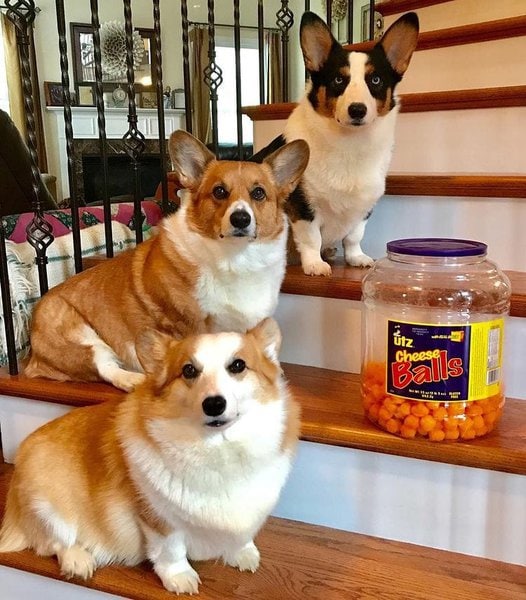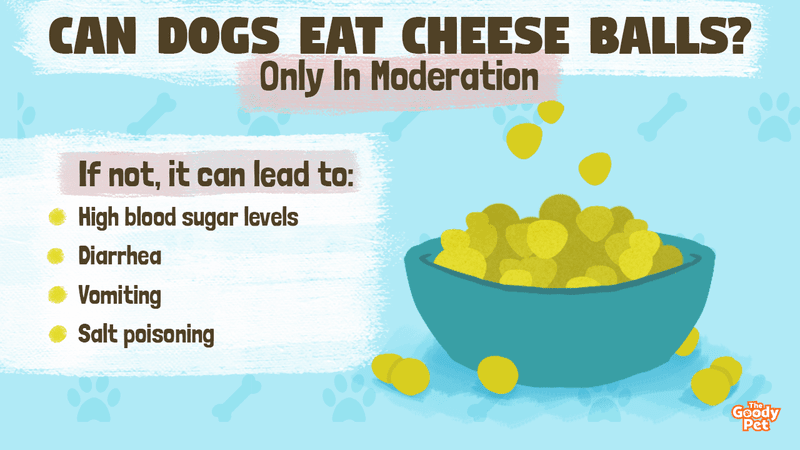Whether it’s the weekend or your off day or perhaps, unwinding after office hours, there are days when all you want is to treat yourself to some fun at home. You grab your blanket, read a nice book or maybe watch your fave show while munching on delicious cheese ball snacks.
Since dogs have a heightened sense of smell, chances are your fur baby will not let you enjoy those cheese balls all by yourself. The question is if it is okay to give cheese balls as special treats to your dog.
Yes, dogs can have cheese balls in a moderate serving without any negative effects on their health. Cheese balls do not contain toxic ingredients like chili and garlic but may have some seasonings that will not potentially hurt your dog when given in moderation.
But, of course, as in all kinds of human food, anything in excess is bad for your dog. Too many cheese balls can lead to future health problems like obesity, kidney disease, and diabetes.
Today is all about cheese balls, how much is safe for your dog, do cheese balls provide nutritional benefits, and what the consequences are in case you overindulge your fur baby with too many cheese balls.
Are Cheese Balls Safe For My Dog?
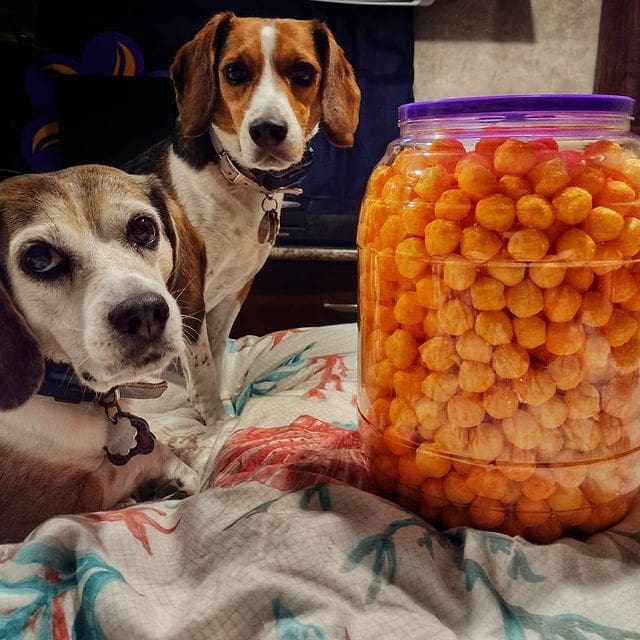
If you only give the right amount of cheese balls, then cheese balls, like Utz Cheese Balls, are safe snacks for dogs.
Though there are a lot of fur parents who are reluctant to share these types of snacks with their fur babies because of the sodium and fat contents.
But, the truth is that dogs can enjoy processed snacks in moderation. By this, it means that cheese balls should only be given occasionally and should only comprise less than 10% of their total diet.
Plus, you have to keep in mind that cheese balls may be very appetizing, but these do not provide your furry friend any nutritional value at all except for the delicious taste.
In case you spoil your fur baby with cheese balls, there will be problems in the health department naturally. So, allow your dog to enjoy a few pieces of cheese balls. Depending on the size of your dog, about 2 to 5 cheese balls once a week should be enough.
Can A Puppy Eat Cheese Balls?
For newborn puppies, we advise against it because they still have no teeth to chew on something crunchy such as Utz cheese balls.
Wait at least until about 4 weeks of age when they can have a taste of a few pieces of cheese balls. We’d recommend one piece once a week at the maximum.
Can A Nursing Dog Eat Cheese Balls?
If you have a pregnant dog, yes, you may give her a few bites. For nursing dogs, though it is generally safe to treat her with some cheese balls, it’s better if you don’t.
This is because she needs more nutritious food than junk food so that her milk production will be at its optimum.
Can An Elderly Dog Eat Cheese Balls?
Yes, you may give an elderly dog cheese balls but be sure to limit it to just 1 to 2 pieces per week.
Older dogs usually have health issues, and in case you gave your older dog more than the safe amount, it might only exacerbate the condition.
You may now ask, if cheese balls are safe for my dog to eat, “how come these should only be given in moderation?” We listed below the ingredients of cheese balls so that you’d be aware of why you have to be very careful when it comes to sharing these snacks with your dog.
The Ingredients Of Cheese Balls
Popular brand names, like Utz and Planters, basically have almost the same ingredients in making cheese balls, and these are:
- Cornmeal
- Vegetable Oil
- Whey
- Salt
- Cheese powder
- Milk fat
- Lactic acid
- Colorings
- Buttermilk solids
As you’ve seen, these ingredients should not be part of the regular diet of your dog. Some of these may be toxic in large amounts, while some cannot be digested well by your dog.
Can Cheese Balls Hurt My Dog?
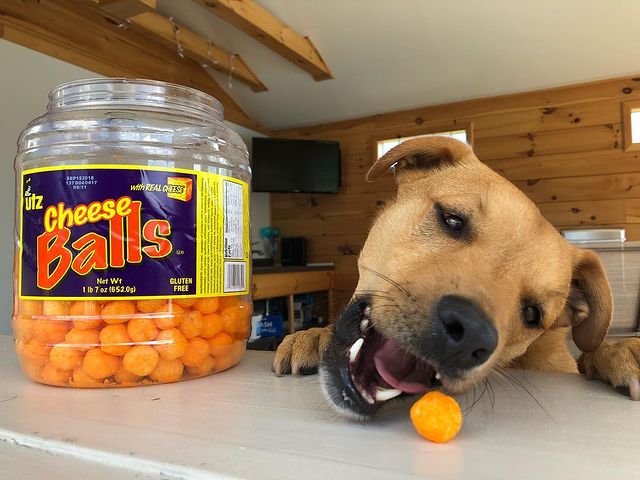
Yes, if you give too many cheese balls to your dog, regardless of age, there’d be negative consequences.
We’ve outlined for you the ingredients of cheese balls, and now we’ll explain to you what some of these ingredients can do to your dog if it has eaten a lot of cheese balls.
Too Much Cornmeal Is Not Good For Dogs
The main ingredient in making cheese balls is cornmeal, which, unfortunately, is not part of the normal diet of dogs. Cornmeal is made from mass-produced yellow corn and does not provide your dog with any nutritional benefits.
Unlike you, your dog’s digestive system is not designed to process corn. Thus, too much of this ingredient equates to trouble in the tummy area.
Plus, corn is high in glycemic index, meaning that it can potentially raise your dog’s blood sugar. This, in turn, leads to a domino effect because a high level of blood sugar and intake of fatty food result in pancreatitis.
Some of the symptoms of pancreatitis are:
- Loss of appetite
- Belly pain
- Vomiting
- Dehydration
Vegetable Oil Is Not Healthy For Dogs
Cheese ball brands like Utz use different kinds of vegetable oil like canola and corn oil. Even if the label states that the cheese balls are baked and not fried, still a great amount of vegetable oil is used.
To attain the appetizing taste of cheese balls, the delicious and flavorful cheese powder is mixed with vegetable oil. Then this mixture is sprayed generously over the baked cheese balls until each ball is completely coated.
Once again, our furry companion’s tummy cannot tolerate too much oil in their diet, so you can expect diarrhea and vomiting in the next hours after munching on too many cheese balls.
Not to forget that vegetable oil is high in calories and in fat, thus, if you fail to give these snacks in moderation, there’s always the possibility of a liver problem.
Whey Is Not For Dogs
Whey or protein powder is specifically made for human consumption, not for dogs.
In case your furry companion had the time of its life munching on cheese balls, you can expect some serious vomiting and diarrhea, loss of appetite, and discomfort. At worst, it may require you to take a costly trip to the vet.
Too Much Salt Is Bad For Your Dog
Anything that is tasty, like cheese balls, is laden with flavorings like salt. Just so you know, 35 oz of Utz cheese balls contains 4.62 grains of salt.
So, if you are not careful, you are risking the life of your dog because of salt poisoning. The common sign of excess salt consumption is drinking too much water.
What About Cheese Balls Made From Real Cheese, Are These OK For My Dog?
These natural cheese balls are actual cheeses like cheddar and Swiss cheese that are formed into balls. Yes, your furry companion can enjoy only a small bite because of the lactose and salt content.
Plus, natural cheese balls are often made with preservatives that can result in problems with the urinary tract and kidneys for your dog, if not given in moderation.
Real Natural Cheese As Training Rewards
Yes, you may give these occasionally to your dog as a reward during training sessions. This will encourage your dog to do well the next time you teach it new commands.
Just make sure that your furry friend is not allergic to cheese. What you can do is give a small slice or cube of natural cheese balls. Then, observe your dog to see if it will show negative reactions like abdominal discomfort.
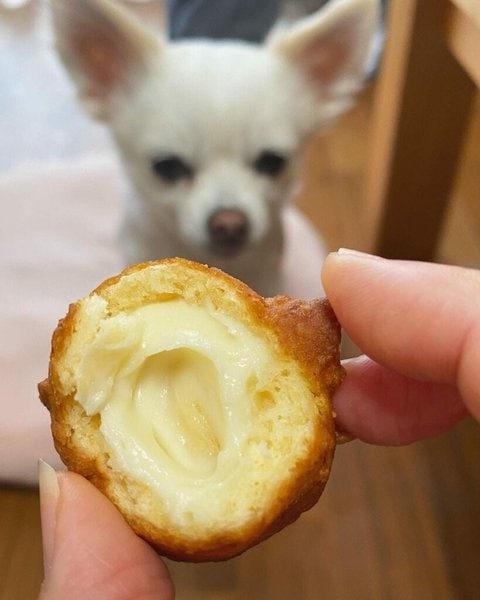
Real Natural Cheese Balls For Weight Management
To help your dog with weight management, yes, you can give it a small portion of natural cheese balls once in a while. The smell and the taste of the cheese balls help enhance the appetite of an underweight dog.
Also, in case your dog is sick and becomes a picky eater, you can also add cheese balls to its regular food to encourage eating.
What Should You Do If Your Dog Ate A Lot Of Cheese Balls?
Whether it’s the processed cheese balls in canisters or the natural cheese balls, you really do not have to worry in case your furry friend only eats a small amount. But the story is different if your dog ate the entire container of cheese balls.
In this case, you need to act immediately by contacting the vet right away. Your vet will most likely ask you to observe and watch for signs like vomiting and diarrhea, especially if these symptoms become progressive.
If that happens, your dog may be administered meds and intravenous fluids to feel better.
